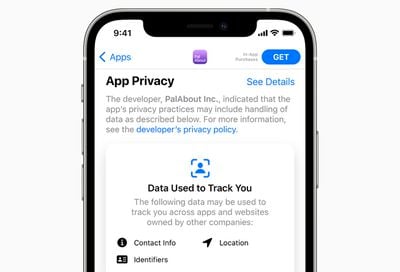The U.S. House Committee on Energy and Commerce this week sent a letter to Apple [PDF] inquiring about the accuracy of the App Privacy labels that Apple asked developers to start adding to apps back in December.

In the letter, the committee asks Apple about reports suggesting that some App Privacy labels are offering "misleading and false information." The query was prompted by a January story from The Washington Post that found over a dozen apps with inaccurate privacy labels.
Apple requires developers to provide information on all of the data that an app collects, but developers are self-submitting the privacy label details on an honor system, without verification from Apple itself. Apple has said that it routinely audits the information that's provided and works with developers to correct inaccuracies, but it's impossible for the company to verify every app's privacy listing.
App developers that do get audited and are found to have failed to disclose accurate privacy information can have future app updates rejected or in some situations, the apps can be removed from the App Store entirely if not brought into compliance.
Committee members Frank Pallone and Jan Schakowsky told Apple that a privacy label is "no protection if it is false," in the letter that urges Apple to improve App Privacy labels.
"According to recent reports, App Privacy labels can be highly misleading or blatantly false. Using software that logs data transmitted to trackers, a reporter discovered that approximately one third of evaluated apps that said they did not collect data had inaccurate labels. A privacy label is no protection if it is false. We urge Apple to improve the validity of its App Privacy labels to ensure consumers are provided meaningful information about their apps' data practices and that consumers are not harmed by these potentially deceptive practices."
Apple has been asked to provide the following details on its App Privacy system:
- Details on the process by which Apple audits the privacy information provided by app developers and how frequently audits are conducted;
- How many of the apps audited since the implementation of the App Privacy label were found to have provided inaccurate or misleading information;
- Whether Apple ensures that App Privacy labels are corrected upon the discovery of inaccuracies or misleading information; and
- Details regarding Apple's enforcement policies when an app fails to provide accurate privacy information for the App Privacy label.
The committee asks that Apple send the requested information by February 23, so Apple has two weeks to craft a response.
Note: Due to the political or social nature of the discussion regarding this topic, the discussion thread is located in our Political News forum. All forum members and site visitors are welcome to read and follow the thread, but posting is limited to forum members with at least 100 posts.


















